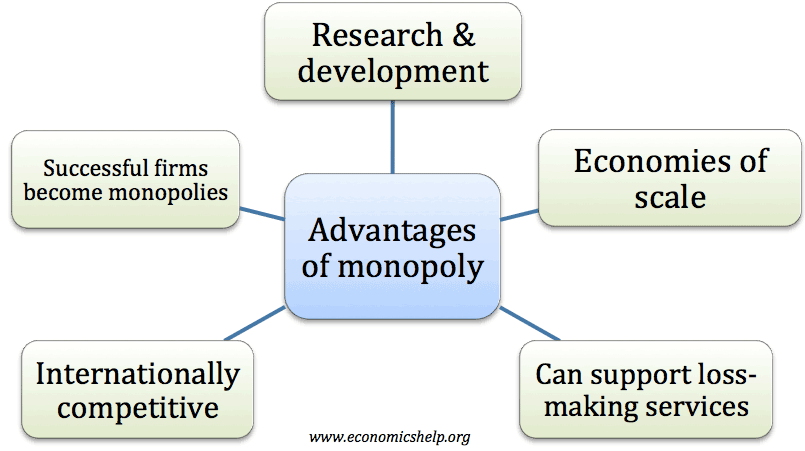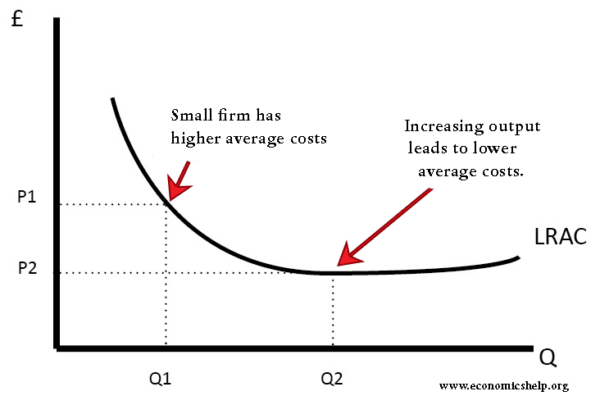Monopolies are generally considered to have several disadvantages (higher price, fewer incentives to be efficient e.t.c). However, monopolies can also give benefits, such as – economies of scale, (lower average costs) and a greater ability to fund research and development. In certain circumstances, the advantages of monopolies can outweigh their costs.
Advantages of Monopoly
- Research and development. Monopolies can make supernormal profit, which can be used to fund high-cost capital investment spending. Successful research can be used for improved products and lower costs in the long term. This is important for industries like telecommunications, aeroplane manufacture and pharmaceuticals. Without monopoly power that a patent gives, there may be less development of medical drugs. In developing drugs, there is a high risk of failure; monopoly profits give a firm greater confidence to take risks and fund research which may prove futile.
- Economies of scale Increased output will lead to a decrease in average costs of production. These can be passed on to consumers in the form of lower prices. See: Economies of Scale This is important for industries with high fixed costs, such as tap water and steel production.
If a monopoly produces at output Q2, average costs (P2) are much lower than if a competitive market had several firms producing at Q1 (P1). This is particularly important for natural monopolies – industries where the most efficient number of firms is one.
- International competitiveness. A domestic firm may have monopoly power in the domestic country but face effective competition in global markets. E.g. British Steel has a domestic monopoly but faces competition globally. With markets increasingly globalised, it may be necessary for a firm to have a domestic monopoly in order to be competitive internationally
- Monopolies can be successful firms. A firm may become a monopoly through being efficient and dynamic. A monopoly is thus a sign of success, not inefficiency. For example – Google has gained monopoly power through being regarded as the best firm for search engines. Apple has a degree of monopoly power through successful innovation and being regarded as the best producer of digital goods.
- Monopoly regulation. One possibility is for a firm to have a monopoly situation, but the government sets up a regulator to prevent the excesses of monopoly power. For example, utilities like water and gas are natural monopolies so it makes sense to have one provider. The regulator can limit price increases and ensure standards of service are met. In theory, this enables the best of both worlds – the monopoly firm can benefit from economies of scale, but the consumer is protected from monopoly prices.
- However, it depends on the quality of regulation. There is a danger of regulatory capture and the regulator allowing the firm to be too profitable.
- See also: Regulation of monopoly
- Subsidise loss-making services. Another potential advantage of a monopoly is that they can use their supernormal profit to subsidise socially useful but loss-making services. For example, a train company can use its monopoly power to set high prices on peak services, but this allows the firm to subsidise unprofitable late-running services on Sat night, which is useful for people going out for the night.
- Avoid the duplication of services. In some areas, the most efficient number of firms is one. For example, if a city deregulates its bus travel, then rival bus companies may compete for profitable peak-hour services. This may lead to increased congestion as several buses turn up at once. It is more efficient to have a monopoly and avoid this inefficient duplication of services.
Examples of industries where monopoly is the best option
Electricity distribution. To distribute electricity to every home in a country, it is most efficient to have a monopoly provider. There are significant economies of scale in having a comprehensive network. There is no point in having two electricity cables running up the same street.
Bus travel in a city. Avoids duplication and enables efficient timetabling.
Pharmaceutical drug provision. The promise of a patent on a drug is sufficient to encourage firms to invest in developing new drugs.
Nuclear power generation. An industry with very high fixed cost and need to set very high safety standards. It shouldn’t need competition between different power plants to get best outcome.
Related


